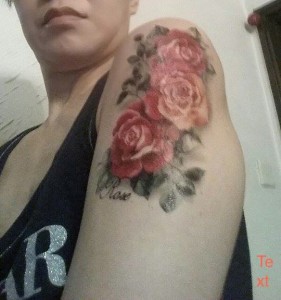Imagine this.
You are biting a juicy dumpling over dim sum lunch with family one day when you accidentally expose a piece of your flesh that quickly ignites a firestorm.
“Wow, what is this?” the woman next to you pressed. She is your aunt.
Before you even get a chance to explain more, she starts grabbing your arm, pushing up your sleeve and brushing around the back of your neck, seeking to see more parts of your body that may reveal what else is etched on your skin.
This is all there is – a rose tattoo on my sister’s arm.

What happened to her came as a shock and a personal affront.
“I felt so embarrassed. I don’t understand why she would become so aggressive? We’re in public. I felt that she was not only rude, but physically intrusive…” Ah-lui (my sister’s nickname) was protesting on the phone with me last week.
“Did you tell her to stop?” I queried.
“Of course. I kept pushing her away, and nobody at the table chimed in. I told her stop roughing me up. I even said, “please, use your mouth, and not your hands.”
In other words, my sister was prepared to have a civil conversation about tattoo as a body art, a form of self-expression. In fact, she changes tattoo as frequently as she changes her hair color. Changeable cosmetic tattoo is fast becoming a fashionable trend among Chinese women, not only in Hong Kong, but also on the mainland.
“She thinks tattoo is inappropriate for women. Tattoo is only for gangsters. And she feels she has every right as a senior authority in the family to show her disdain. No questions asked.”
My sister’s disgust resonated with me. My head began swirling with these questions.
Why can’t we open our mind and talk about different practices of self-expression in the age of modern living?
Why can’t we suspend judgment and set space for personal choices that are new and different?
Why can’t we show mutual respect across generations, especially between women who have worked so hard to fight sexism that’s deeply ingrained in the Chinese cultural psyche?
Do we not care about understanding one another?
Do we care only about asserting authority? For what purpose? To whose benefits? At what cost?
Just as I raised these issues in my own mind, I came across “China’s good girls want tattoos” in the Tealeaf Nation. I shared it with my sister who quickly shared it with her friends on Facebook. Her message? Tattoo is not a gangster’s monopoly.
As the article points out, this trendy kind of artsy tattoo is beginning to transcend social stigma into an aesthetic territory that is accessible to women across the spectrum of status and class. It is a mark of individuality and personality. It also sparks an open dialogue on social media chat room across the gender divide. One woman asks if her body tattoo (even if it’s delicate and removable) will scare men away, making her less marriageable? While that betrays her fear about her appeal as a wife, her willingness to share her vulnerability immediately leads to a man’s response – “it depends on where the tattoo is.”
While traditional Asian family has yet to fully embrace a woman’s choice of body art like cosmetic tattoo, we, as a society should take the first step of opening our minds and ears to what truly lies beneath the skin.
What is a woman trying to convey with a tattoo?

Courtesy of “king of the kool kids“
My sister’s changing preferences, from a rose to a butterfly tattoo, reflects her changing moods, as I’ve come to understand. There are multiple reasons for her mood change as there are for mine and for yours. But if an artsy tattoo is her choice to reflect her sense of self and beauty during these fluctuating times in her life, why can’t we accept it as is?


